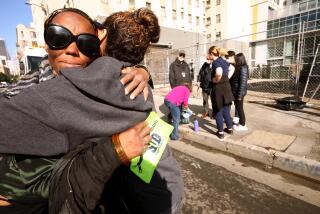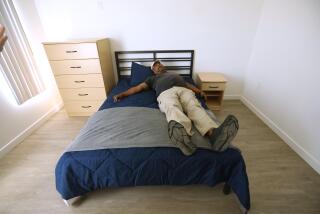Finding Hope in Helping
- Share via
Susan Dempsey leads a tour at Step Up On Second in Santa Monica. Here are 20 or so mentally ill people, some homeless, glued to a nature film. There are a dozen on cots, taking an afternoon nap. Behind are the showers, laundry, storage space for personal articles. The tables are for art projects. That’s the coffee maker, where anyone can get a hot cup. This is the front desk (a conversation goes on about a potential job). That’s the clothing bank.
On any day, 90 to 150 adults suffering from persistent and disabling mental illnesses will come to this day center. They can’t handle the pressures of a job, Dempsey says, “but there can be a quality of life. And the goal is not to make everyone return to work--that is not realistic--but some can. It’s difficult to pick out the ones who will make it, because some of our worst down-and-outs have been our success stories.”
Tall, confident and gray-haired at 54, Dempsey has made Step Up On Second her life for five years and Saturday, she was awarded the Woman of Achievement by the Santa Monica Bay American Assn. of University Women.
Twelve years ago she was a happily married wife and mother of two teen-agers who made A’s in school. Then her son Mark (in the top 2% in his SATs) had a mental breakdown and was diagnosed with schizophrenia. Her life was shattered.
“His anxieties, his fear of failing, and no sense that he could accomplish anything--that is what drove me to get involved. I couldn’t handle it anymore,” she recalls. “The inability to help someone that you love is very painful, so I felt if I could put the energy into helping people recover as a group, it would help ease me through my pain, and it has been a lifesaver. I get so much pleasure out of seeing people get better. There is hope. They need nurturing.”
For two years after her son’s diagnosis, the psychiatrist did not include the Dempseys in their son’s treatment. After three years, however, Susan Dempsey became involved with the self-help Alliance for the Mentally Ill. She’s been president of the group for seven years. It was the alliance that launched Step Up On Second with private funds five years ago. Today, it has a $500,000 annual budget, including $210,000 from Los Angeles County. The facility is closely patterned after Fountain House in New York, the residential and social program where her son now lives.
Today, Susan Dempsey is the nonprofit group’s executive director. She’s helping head the $4-million, three-year effort to transform an existing shell into a two-floor area with a training-site salad bar, a kitchen to serve meals to the homeless and improved vocational, recreational and shower facilities. Eventually the plan is to add two additional floors for 32 single-room apartments.
“This has been gratifying--absolutely,” she said of her accomplishments. “I feel I have made a difference. There is still so much stigma attached to mental illness. People feel they can’t tell friends and neighbors, so I feel I have a lot to share. Mental illness affects one out of five families. It’s still in the closet. We need a spokesman--someone like Betty Ford--to say ‘I lived through it.’
“It’s been difficult on me (she said she became so obsessed with her cause that she divorced her third husband--”a wonderful man”); difficult on our family. (Her daughter is in medical school.) And I was not a bad parent. I did the best I could. My son has more courage than most people I know. He remembers when he was 18. With Alzheimer’s, you get worse and you don’t know, but with this--with this illness you can see that your life is empty.”
More to Read
Sign up for Essential California
The most important California stories and recommendations in your inbox every morning.
You may occasionally receive promotional content from the Los Angeles Times.





